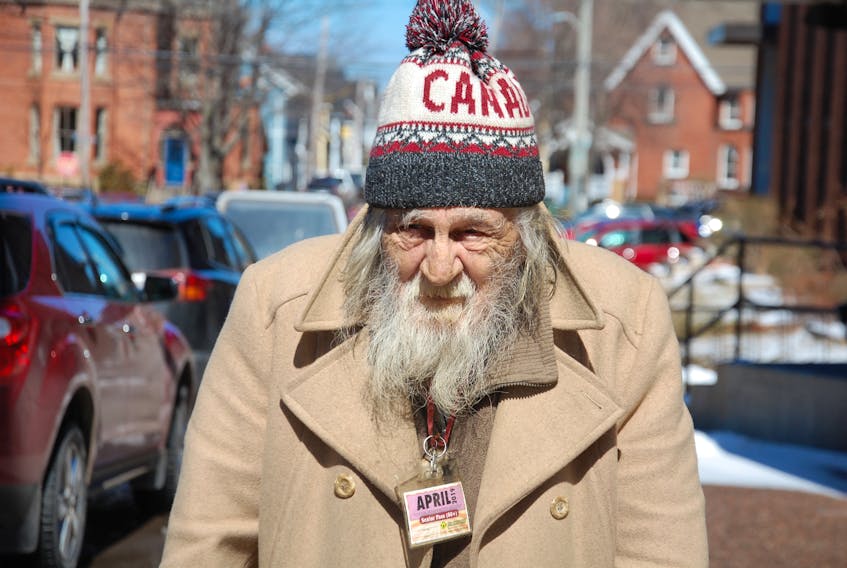This is the next story in a series The Guardian is publishing on district profiles and election issues up until April 22. Click here to visit our provincial election section to read more.
Judy Barrett managed to leave personal poverty in her past but has never turned her back on the poor.
The long-time P.E.I. resident grew up in Newfoundland, a poor child in a poor family.
She was one of 14 children. Her father, for some reason, did not get disability pay after injuring his back while working as a miner.
Barrett’s parents struggled to put food on the table. Second-hand clothes were provided by relatives.
“Growing up I felt embarrassed being on welfare,’’ she says.
She managed, through hard work, education and some good fortune, to climb out of poverty. A mother of four, she has enjoyed decades of prosperity in Prince Edward Island.
Still, she has never forgotten what it is like to be poor.

Barrett has been a strong advocate for improvements to help lift Islanders out of the humbling, unhealthy throes of poverty.
She has been involved for more than 20 years with the Holy Redeemer Society of St. Vincent de Paul – five as president – offering friendship and assistance to the poor.
Over the years, The Guardian has run numerous opinion pieces by Barrett in which she has highlighted inadequate support and lack of action by one provincial government to the next in addressing poverty in P.E.I.
“There is nothing complicated about not having enough money to pay for what is needed,’’ says Barrett.
“Governments will tell us they don’t have the money to put towards improvements to programs for the vulnerable, yet frequently we hear of thousands and millions of dollars being wasted in the name of job creation that could be passed on directly to those who need it.’’
However, with a provincial election campaign in full gear, all four parties are offering a host of promises to improve the plight of the poor.
The Liberal party pledges to provide $2 million to non-governmental organizations that seek to assist Islanders in need.
The PC party assures voters, if elected, it will raise the basic personal tax exemption to the national average of $12,000.
The Green party, if it makes electoral history in P.E.I. by getting the nod to govern the province, says it will set up a commission to develop a basic income guarantee pilot program.
And the NDP, the party least likely to form the next government according to polls, has long endorsed many changes it deems necessary to effectively address poverty.
Bare minimum
- Islanders who are paid the least have been getting slightly more since April 1. Minimum wage increased from $11.55 an hour to $12.25 at the start of the month.
- P.E.I. has the highest minimum wage in Atlantic Canada. Alberta, at $15 an hour, has the highest in the country.
- The NDP promise an immediate increase of minimum wage to $15 an hour, rising within four years to at least $17 within four years.
- The Green party pledges to raise minimum wage in “consistent and predictable increments’’ to $15 per hour by 2023.
- The Liberal party is committed to increasing the wage to $14 by 2022.
Leslie Gallant, 84, of Charlottetown tries to get by on a modest old age pension.
He feels let down by one government after the next.
“They don’t give you enough,’’ he says.
He is “looking for a little bit more help’’ and believes the NDP would best assist seniors like him.
NDP Leader Joe Byrne, while early in his campaign promised to hike minimum wage to $15 an hour, noted more than 38 per cent of the Island’s workforce is classified as the working poor.
“Parties trying to get elected can promise what they think will get them elected without being realistic about where the money will come from to do as they promised."
-Judy Barrett
Mike MacDonald, executive director of the Upper Room Hospitality Ministry, continues to see in his nearly 18 years of providing food to the less fortunate far too many Islanders wallowing in poverty.
Food banks across the province, he says, are serving 3,200 people each month.
“To me, it’s a big number,’’ he says. “It’s a depressing number.’’
Addressing the problem effectively, he adds, requires a broad approach that ranges from increasing social assistance rates to putting more money and resources into mental health care.
“We really need to set some targets and some concrete plans,’’ he says.
MacDonald adds that determining which party is best suited to lift Islanders out of poverty is a “huge factor’’ in where he places his vote.
Barrett, though, has long been leery of platform promises.
“Parties trying to get elected can promise what they think will get them elected without being realistic about where the money will come from to do as they promised,’’ she says.
“The existing Liberal government had four years to implement meaningful changes to help those living in poverty rather than presenting us now with changes they will make if elected again.’’
She believes implementing a pilot project of a guaranteed basic income in P.E.I. would go a long way towards determining if it can work in raising the standard of living for impoverished Islanders.
Barrett would also like to see the basic personal tax exemption raised on P.E.I. to the national average, allowing more Islanders to pay less taxes.
An increase to social assistance rates to reflect real cost of living and adequate and affordable housing also need to be part of the equation, she adds.
“I think we need better quality politicians who work together for the betterment of Islanders,’’ she says.
“They may represent a certain location or party, but they are supposed to be working together for the well-being of all Islanders.’’
Fighting poverty
Here are the four parties’ platforms to address poverty in P.E.I.
NDP:
- Immediate increase to minimum wage to $15 an hour, rising within four years to at least $17, – leading to an indexed liveable wage.
- Rekindle the drive for a basic income on P.E.I.
- Ensure free post-secondary tuition for Island students for their first degree or diploma.
- Increase affordability and accessibility of high-quality childcare and disability supports.
- Continue advocating for a universal Canadian child-care program.
- Address food security.
- Ensure an Island pension.
- Ensure social assistance rates for food, housing and other household needs match the actual cost of living.
- Implement publicly owned and operated housing that uses geared-to-income rental rates.
- Implement a housing bank to acquire and protect land and buildings which can be used for public housing.
Green party:
- Set up a commission to develop a basic income guarantee pilot program.
- Create a client-centred approach for social services by conducting a red tape review of all social, family and disability support services.
- Increase the social services housing subsidy rate, food rate and personal allowance rate to ensure the most vulnerable Islanders are not having to choose between rent and food.
- Provide a secure income for Islanders who are unable to enter the workforce due to long-term disabilities
- Provide free transit passes to those using social support services and explore subsidizing passes for seniors across the province.
Liberal party:
- Provide $2 million to non-governmental organizations that seek to assist Islanders in need.
- Provide additional resources for the children’s commissioner and advocate and Office for Children and Youth.
- Reduce poverty through access to safe and secure housing by investing $30 million in new housing, adding 1,400 new affordable units and providing easier access to rent supplements and investing additional $750,000 per year in home renovations and repairs to allow seniors to stay in their homes.
- Improve access to childcare, education, training and employment.
- A new $500 education bond for every eligible child in P.E.I. under 16 beginning in 2020.
- Increase minimum wage to $14 per hour by 2022.
- Tax relief by raising basic personal amount to $10,000 by 2020.
- New P.E.I. Workers Benefit providing up to $1,600 for single worker and $2,700 for a couple or family.
- Eliminate dispensing fees for all lower-income seniors and cut in half cost to seniors of accessing generic drugs.
- New school food program with pay-what-you-can model.
- Provide in-partnership with employers uninsured working Islanders in seasonal industries access to health and benefits plan.
PC party:
- Raise basic personal tax exemption to the national average of $12,000.
- Increase the base amount of the low income tax reduction program from $17,000 to $20,000.
- Coverage of the shingles vaccine for Islanders over the age of 60.
- First 1,000 Days Initiative to strengthen and better co-ordinate nutritional and educational supports for children in the first three years of life.
- New $500 Wellness and Physical Activity Tax Credit to help build healthier futures for Islanders.
- New $1 million fund for non-government organizations, many of which support housing and food insecure Islanders and employment development opportunities.









